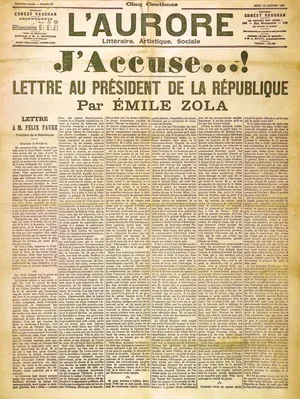On 13 January 1898, French writer and intellectual Émile Zola published his famous open letter, J’Accuse…!, in the Parisian newspaper L’Aurore. This landmark moment in history was a passionate defence of Alfred Dreyfus, a Jewish officer in the French Army wrongly convicted of treason.

The Dreyfus affair
The Dreyfus Affair, one of the most controversial episodes in French history, began in 1894 when Captain Alfred Dreyfus was accused of passing military secrets to Germany. The trial, which was marred by anti-Semitism and a lack of credible evidence, resulted in Dreyfus being convicted and sentenced to life imprisonment on Devil’s Island, a remote penal colony off the coast of French Guiana.
Evidence emerged later that another officer, Ferdinand Walsin Esterhazy, was the real culprit. Despite this, the French military and government worked to suppress the truth, fearing damage to their reputation.
Zola’s intervention
Émile Zola, already a celebrated novelist and public intellectual, risked his career and personal safety to speak out against the injustice. In his letter, addressed to French President Félix Faure, Zola accused the military and judiciary of fabricating evidence, covering up Esterhazy’s guilt, and succumbing to anti-Semitic prejudice.
Published on the front page of L’Aurore, the letter listed a series of accusations against key figures in the case. Zola boldly wrote, “The truth is on the march, and nothing will stop it.”
Impact and consequences
The publication of J’Accuse…! sparked a political and social firestorm. Zola was charged with libel and convicted in a high-profile trial, forcing him to flee to England to avoid imprisonment. However, his letter galvanised public opinion and played a crucial role in exposing the flaws in the case against Dreyfus.
Over time, the truth prevailed. Dreyfus was eventually exonerated in 1906, reinstated in the army, and honoured for his service. Zola’s actions were widely recognised as pivotal in bringing justice to Dreyfus and highlighting the dangers of institutional prejudice.
Also read: ON THIS DAY: French writer Simone de Beauvoir is born (1908)


